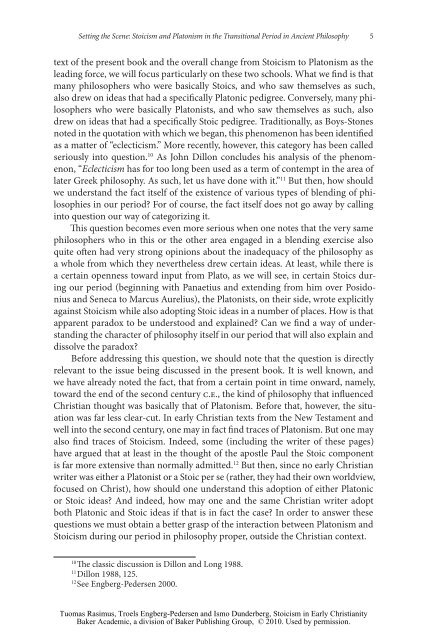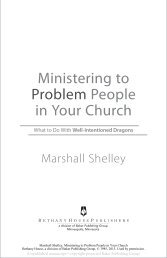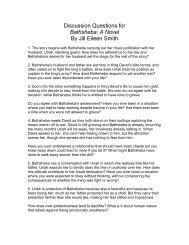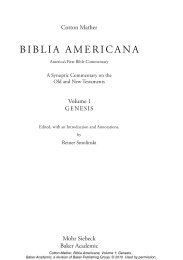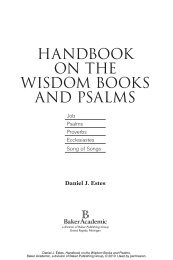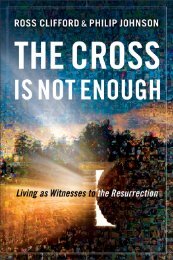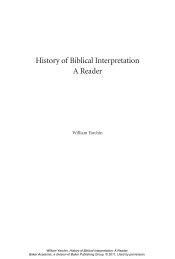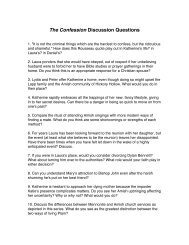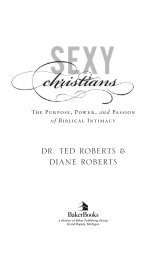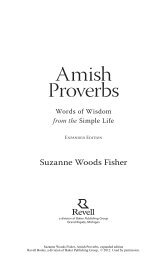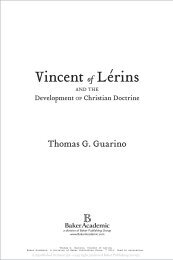stoicism in early christianity - Baker Publishing Group
stoicism in early christianity - Baker Publishing Group
stoicism in early christianity - Baker Publishing Group
You also want an ePaper? Increase the reach of your titles
YUMPU automatically turns print PDFs into web optimized ePapers that Google loves.
Sett<strong>in</strong>g the Scene: Stoicism and Platonism <strong>in</strong> the Transitional Period <strong>in</strong> Ancient Philosophy 5<br />
text of the present book and the overall change from Stoicism to Platonism as the<br />
lead<strong>in</strong>g force, we will focus particularly on these two schools. What we f<strong>in</strong>d is that<br />
many philosophers who were basically Stoics, and who saw themselves as such,<br />
also drew on ideas that had a specifically Platonic pedigree. Conversely, many philosophers<br />
who were basically Platonists, and who saw themselves as such, also<br />
drew on ideas that had a specifically Stoic pedigree. Traditionally, as Boys-Stones<br />
noted <strong>in</strong> the quotation with which we began, this phenomenon has been identified<br />
as a matter of “eclecticism.” More recently, however, this category has been called<br />
seriously <strong>in</strong>to question. 10 As John Dillon concludes his analysis of the phenomenon,<br />
“Eclecticism has for too long been used as a term of contempt <strong>in</strong> the area of<br />
later Greek philosophy. As such, let us have done with it.” 11 But then, how should<br />
we understand the fact itself of the existence of various types of blend<strong>in</strong>g of philosophies<br />
<strong>in</strong> our period? For of course, the fact itself does not go away by call<strong>in</strong>g<br />
<strong>in</strong>to question our way of categoriz<strong>in</strong>g it.<br />
This question becomes even more serious when one notes that the very same<br />
philosophers who <strong>in</strong> this or the other area engaged <strong>in</strong> a blend<strong>in</strong>g exercise also<br />
quite often had very strong op<strong>in</strong>ions about the <strong>in</strong>adequacy of the philosophy as<br />
a whole from which they nevertheless drew certa<strong>in</strong> ideas. At least, while there is<br />
a certa<strong>in</strong> openness toward <strong>in</strong>put from Plato, as we will see, <strong>in</strong> certa<strong>in</strong> Stoics dur<strong>in</strong>g<br />
our period (beg<strong>in</strong>n<strong>in</strong>g with Panaetius and extend<strong>in</strong>g from him over Posidonius<br />
and Seneca to Marcus Aurelius), the Platonists, on their side, wrote explicitly<br />
aga<strong>in</strong>st Stoicism while also adopt<strong>in</strong>g Stoic ideas <strong>in</strong> a number of places. How is that<br />
apparent paradox to be understood and expla<strong>in</strong>ed? Can we f<strong>in</strong>d a way of understand<strong>in</strong>g<br />
the character of philosophy itself <strong>in</strong> our period that will also expla<strong>in</strong> and<br />
dissolve the paradox?<br />
Before address<strong>in</strong>g this question, we should note that the question is directly<br />
relevant to the issue be<strong>in</strong>g discussed <strong>in</strong> the present book. It is well known, and<br />
we have already noted the fact, that from a certa<strong>in</strong> po<strong>in</strong>t <strong>in</strong> time onward, namely,<br />
toward the end of the second century c.e., the k<strong>in</strong>d of philosophy that <strong>in</strong>fluenced<br />
Christian thought was basically that of Platonism. Before that, however, the situation<br />
was far less clear-cut. In <strong>early</strong> Christian texts from the New Testament and<br />
well <strong>in</strong>to the second century, one may <strong>in</strong> fact f<strong>in</strong>d traces of Platonism. But one may<br />
also f<strong>in</strong>d traces of Stoicism. Indeed, some (<strong>in</strong>clud<strong>in</strong>g the writer of these pages)<br />
have argued that at least <strong>in</strong> the thought of the apostle Paul the Stoic component<br />
is far more extensive than normally admitted. 12 But then, s<strong>in</strong>ce no <strong>early</strong> Christian<br />
writer was either a Platonist or a Stoic per se (rather, they had their own worldview,<br />
focused on Christ), how should one understand this adoption of either Platonic<br />
or Stoic ideas? And <strong>in</strong>deed, how may one and the same Christian writer adopt<br />
both Platonic and Stoic ideas if that is <strong>in</strong> fact the case? In order to answer these<br />
questions we must obta<strong>in</strong> a better grasp of the <strong>in</strong>teraction between Platonism and<br />
Stoicism dur<strong>in</strong>g our period <strong>in</strong> philosophy proper, outside the Christian context.<br />
10 The classic discussion is Dillon and Long 1988.<br />
11 Dillon 1988, 125.<br />
12 See Engberg-Pedersen 2000.<br />
Tuomas Rasimus, Troels Engberg-Pedersen and Ismo Dunderberg, Stoicism <strong>in</strong> Early Christianity<br />
<strong>Baker</strong> Academic, a division of <strong>Baker</strong> Publish<strong>in</strong>g <strong>Group</strong>, © 2010. Used by permission.


